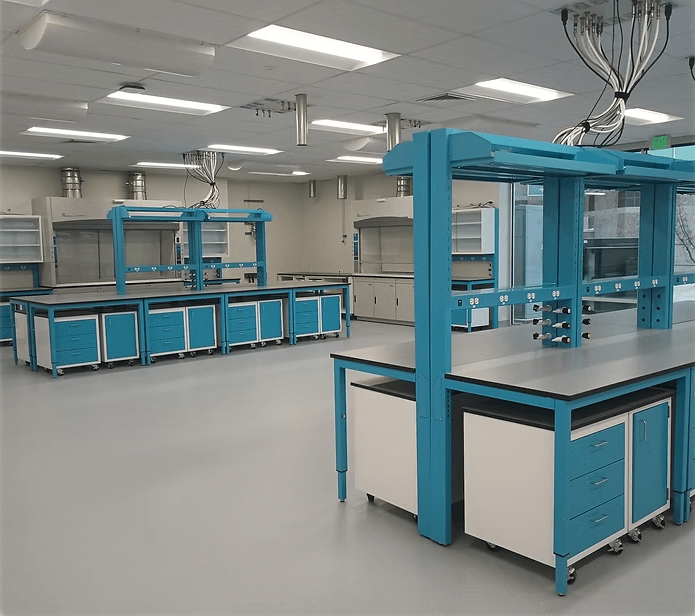A well-organized and functional laboratory is key to ensuring productivity and safety in any scientific or research setting. One of the most important elements of a lab’s infrastructure is the lab bench table. Whether you are setting up a new laboratory or upgrading your existing space, choosing the right lab bench table is essential for creating an environment that fosters efficient work, supports safety standards, and allows for easy access to tools and materials.
The Importance of a Well-Designed Lab Bench Table
The lab bench table is the cornerstone of any laboratory workspace. It provides a stable surface where experiments can be conducted, equipment can be stored, and materials can be organized. However, not all lab benches are created equal. The right table can help streamline workflows, reduce clutter, and ensure that lab activities are conducted safely and efficiently.
A well-designed lab bench can also improve ergonomics, preventing strain or discomfort during long hours of work. With the right table, researchers can have everything they need within arm’s reach, which reduces the time spent searching for tools or materials.
Key Considerations for Choosing the Right Lab Bench Table
Selecting a lab bench table may seem like a straightforward task, but there are several factors to take into account to ensure that you choose the best option for your specific needs. Below are the most important considerations to keep in mind when shopping for a lab bench:
- Material Type: The material used in the construction of the lab bench table is crucial for durability, cleanliness, and resistance to chemicals. Common materials include stainless steel, laminate, and epoxy resin. Stainless steel is often chosen for its resistance to corrosion, especially in laboratories where chemicals and liquids are used. Laminate tables are suitable for general use, while epoxy resin tables are ideal for environments that deal with harsh chemicals.
- Size and Space: The size of the lab bench table should be appropriate for the tasks that will be carried out on it. Too small, and it will create a cramped workspace. Too large, and it might waste valuable floor space. You should also consider whether you need adjustable-height tables for improved ergonomics or fixed-height tables that provide a stable work surface.
- Storage Options: Depending on the nature of your work, you may need additional storage options integrated into your lab bench table. Many tables come with built-in drawers or shelving to help store chemicals, tools, and equipment. Cabinets underneath the table can be used for more substantial storage needs, ensuring that essential materials are easily accessible without creating clutter.
- Weight Capacity: A high-quality lab bench table should be able to withstand the weight of heavy equipment and tools. Make sure that the table you choose has a sufficient weight capacity to hold the instruments and materials you plan to use.
- Chemical and Temperature Resistance: If your lab involves the use of chemicals, high heat, or cold, you need a table surface that can handle these conditions without deteriorating. Choosing a table with chemical-resistant properties or heat-resistant surfaces can prevent damage and increase the longevity of your lab furniture.
Customization and Flexibility in Lab Bench Table Design
In many laboratory settings, a standard lab bench may not suffice due to the specialized needs of the work being carried out. Fortunately, many lab bench tables are customizable, offering flexibility in design and configuration. Whether you require more storage, specialized surface treatments, or a specific shape to fit a particular area, a customized bench can provide a solution tailored to your exact requirements.
Customization can also extend to features such as integrated power outlets, task lighting, or gas and water hookups, which are essential for certain laboratory processes. These options ensure that the workspace is not only functional but also fully equipped for specialized tasks.
Choosing the Best Lab Bench Table for Your Laboratory
When selecting the perfect lab bench table, it’s important to consider the unique demands of your laboratory environment. If your lab deals with hazardous chemicals or heavy machinery, your table should be able to withstand harsh conditions. Similarly, if you work in a cleanroom or biological lab, the table should have features that prevent contamination, such as smooth, non-porous surfaces and easily cleanable materials.
Overall, the ideal lab bench table will enhance your lab’s functionality by offering a safe, organized, and efficient workspace for all types of scientific activities. Investing in the right lab furniture can increase productivity, improve safety compliance, and contribute to the long-term success of your laboratory.
Final Words
Choosing the right lab bench table is a key factor in creating a functional, safe, and efficient laboratory space. By considering factors such as material, size, storage needs, and customization options, you can ensure that your lab’s workstations meet both your practical and safety requirements. A high-quality lab bench can improve workflow, enhance safety, and provide a reliable foundation for all your laboratory work.

